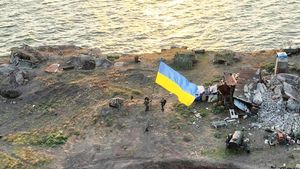On Sunday, February 23, 2025, Germany held snap elections for the Bundestag, necessitated by the collapse of the coalition led by Chancellor Olaf Scholz. This election is poised to be pivotal, not only for Germany's domestic policy but also for its foreign relations and stance on pressing global issues such as the conflict with Ukraine.
Polling stations across the country opened at 8 AM and closed at 6 PM, providing approximately 59.2 million eligible voters—about 42% of whom are over 60 years old—the opportunity to cast their ballots. With 29 political parties vying for representation, the political atmosphere is fraught with anticipation and uncertainty. Recent surveys indicated the Christian Democratic Union (CDU), under the leadership of Friedrich Merz, leading with roughly 30% support, followed by the far-right Alternative for Germany (AfD) garnering about 20% and the ruling Social Democratic Party (SPD) trailing with around 15%.
The snap elections were called after the Bundestag voted out Scholz’s government last year following disagreements about budget financing, leading to the dissolution of the ruling coalition. Traditionally, elections are held every four years, but this abrupt decision signifies the political volatility currently sweeping through Germany.
Friedrich Merz, the 69-year-old CDU candidate, is anticipated to take the spotlight if the latest polls hold true. Having previously fought long and hard for the leadership of the CDU, Merz now faces the challenge of not only winning votes but also forming viable coalitions. His platform includes promises to strengthen Germany’s military aid to Ukraine and revisions of Germany’s immigration policies.
Olaf Scholz, still pushing for survival as the leader of the SPD, emphasizes social guarantees and moderate military support for Ukraine, though he faces backlash even within his coalition about this. Notably, he has resisted calls to supply Ukraine with the Taurus long-range missiles, fearing this might escalate tensions with Russia.
Another key player, Robert Habeck of the Greens, has advocated for significant increases to defense spending and aims to bolster Germany's role within NATO significantly, positioning the Greens as staunch supporters of Ukraine, contrary to Scholz's more cautious approach.
Meanwhile, the AfD, led by Alice Weidel, is experiencing unprecedented support, tapping deeply ingrained anxieties concerning immigration and Germany’s relationship with Russia, contrasting sharply with mainstream party policies. The AfD's popularity, mainly among voters disillusioned with traditional parties, raises concerns about the future political discourse within Germany.
The new Leftist Union (SSW), spearheaded by Sarah Wagenknecht, emerges as another significant entity, representing the far-left wing of the political spectrum. The SSW has positioned itself against military interventions and advocates for renewed ties with Russia, contrasting its stance with other candidates.
The election coincided with early winter tensions across Europe related to energy security, migration, and the urgent humanitarian needs resulting from the Ukraine conflict. Recently, the CDU and AfD voted jointly on anti-immigration measures, which sparked protests and public outrage, raising questions about the limits of political collaboration.
After polls close, exit polls will provide initial insights; full results will follow overnight leading to coalition discussions, which could stretch over weeks. The dynamics suggest two potential government formations: The traditional 'Grand Coalition' between the CDU and SPD or possibly even involving the Greens, should they maintain significant representation.
Experts are predicting several scenarios depending on who emerges with enough parliamentary influence. The implication of the AfD's performance could reshape the existing political norms, as major parties have committed not to collaborate with the far-right.
The outcomes from this election could decide more than just who governs Germany; they may also cement the country's stance within Europe and its strategy concerning the Ukraine crisis. Should right-wing narratives gain traction, Germany's approach may not only be removed from advocating for Ukrainians but also lean toward diplomatic overtures with Russia.
Engaging observers like political analysts and journalists have commented on the stakes of these elections, emphasizing their potential to transform Germany's role as not just Europe's economic leader but also as a key player on the international peacekeeping stage. Despite the expected challenges of forming stable coalitions, voters seem eager for change, driven by the complex blend of social, economic, and foreign policy challenges facing the nation.



